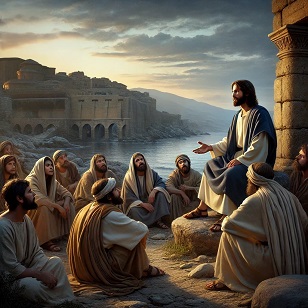
Jesus told His disciples not to tell people of Him. Why?
In Mark 8:30 Jesus gives an unusual command to His disciples:
And he charged them that they should tell no man of him.
This verse comes immediately after Peter's declaration that Jesus is the Christ. Here is the context from the book of Mark Chapter 8:
27 And Jesus went out, and his disciples, into the towns of Caesarea Philippi: and by the way he asked his disciples, saying unto them, Whom do men say that I am?
28 And they answered, John the Baptist; but some say, Elias; and others, One of the prophets.
29 And he saith unto them, But whom say ye that I am? And Peter answereth and saith unto him, Thou art the Christ.
30 And he charged them that they should tell no man of him.
31 And he began to teach them, that the Son of man must suffer many things, and be rejected of the elders, and of the chief priests, and scribes, and be killed, and after three days rise again.
Understanding why Jesus instructed His disciples to keep His identity a secret at that time is an important study, and involves examining several aspects of His ministry and the context in which this command was given.
Messianic Secret
A significant theme in the Gospel of Mark is the "Messianic Secret," where Jesus often tells people not to reveal His identity as the Messiah. Scholars suggest several reasons for this:
Misunderstanding of Messiahship: The prevailing Jewish expectation of the Messiah was that of a political and military leader who would liberate Israel from Roman occupation. Jesus' mission as the suffering servant ( Isaiah 53 ) and spiritual redeemer was radically different from these expectations. Prematurely revealing His identity could have led to misunderstandings about His mission.
Timing: Jesus had a specific timeline for His ministry, including His teachings, miracles, and ultimately His crucifixion and resurrection. Revealing His identity too early could have accelerated events before His work was complete.
Preparation of the Disciples
At this point in the narrative, the disciples themselves did not fully understand the nature of Jesus' mission. Peter's declaration in Mark 8:29 shows a recognition of Jesus' messianic role, but immediately after, in Mark 8:31-33, Jesus predicts His suffering and death, which Peter rebukes. This indicates that the disciples were not yet ready to comprehend or convey the full message of Jesus' identity and mission.
Avoiding Political Repercussions
Proclaiming Jesus as the Messiah could have provoked the Roman authorities and Jewish leaders, leading to increased opposition and possible arrest before the appointed time. By keeping His identity a secret, Jesus could continue His ministry and teaching without immediate interference.
Focus on Teaching and Healing
Jesus' primary focus during His ministry was teaching about the Kingdom of God and performing miracles to demonstrate God's power and compassion. Publicizing His messianic identity might have shifted the focus to His person rather than His message and mission.
Jesus instructed His disciples to keep His identity as the Messiah a secret to prevent misunderstanding of His mission, to align with His divine timeline, to avoid premature political and social repercussions, and to ensure that His teachings and miracles remained the primary focus of His ministry.
Jesus indicates that His disciples are ready to preach the truth of who He is after His resurrection and the coming of the Holy Spirit. This pivotal moment is recorded in several places in Scripture:
The Great Commission (Matthew 28:18-20)
After His resurrection, Jesus appears to His disciples and gives them the Great Commission:
And Jesus came and spake unto them, saying, All power is given unto me in heaven and in earth. Go ye therefore, and teach all nations, baptizing them in the name of the Father, and of the Son, and of the Holy Ghost: Teaching them to observe all things whatsoever I have commanded you: and, lo, I am with you alway, even unto the end of the world.
Acts 1:8
Before His ascension, Jesus promises the disciples that they will receive power from the Holy Spirit and be His witnesses:
But ye shall receive power, after that the Holy Ghost is come upon you: and ye shall be witnesses unto me both in Jerusalem, and in all Judaea, and in Samaria, and unto the uttermost part of the earth.
Luke 24:45-49
After His resurrection, Jesus opens the understanding of His disciples to the Scriptures and instructs them to wait for the power from on high:
Then opened he their understanding, that they might understand the scriptures, And said unto them, Thus it is written, and thus it behoved Christ to suffer, and to rise from the dead the third day: And that repentance and remission of sins should be preached in his name among all nations, beginning at Jerusalem. And ye are witnesses of these things. And, behold, I send the promise of my Father upon you: but tarry ye in the city of Jerusalem, until ye be endued with power from on high.
These passages collectively show that Jesus considered His disciples ready to preach the truth of who He is after they had witnessed His resurrection and received the Holy Spirit. The empowerment by the Holy Spirit was crucial for them to fully understand and effectively communicate the message of Jesus as the Messiah and the Savior of the world.